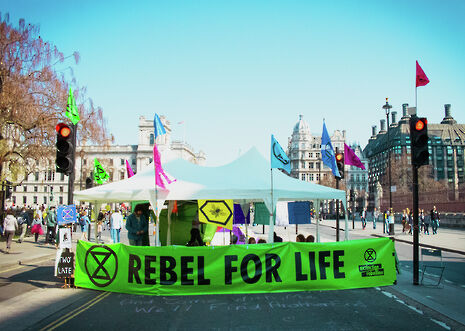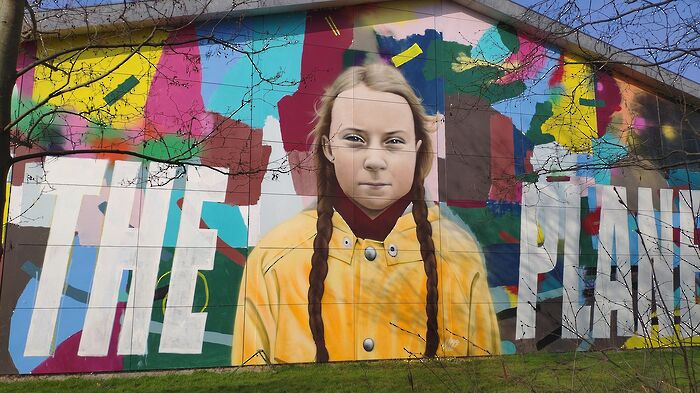Environmental activism has a class problem
In order to effectively tackle climate issues, we need to abandon the ‘white saviour’ rhetoric and make our activism more intersectional, argues Phoebe Bunt

Extinction Rebellion (XR), one of the UK’s highest profile environmental protest movements, is something Cambridge students have and might be expected to get behind. Perhaps unsurprisingly, therefore, it has been labelled a “white middle-class ghetto,” a hobby for those who can afford to be arrested for civil disobedience in the name of climate catastrophe.
Indeed, it is undeniable that the movement’s image and tactics alienate minority groups. Just yesterday morning, protestors with XR stalled the London Underground's Jubilee Line, delaying commuters during morning rush hour. The protest placed those with the least job security at the most risk for retribution.
A major part of XR’s campaign strategy is to ‘sacrifice’ activists to arrest, with the confidence that the judicial system will be on their side. In May, an open letter published by ‘The Wretched of the Earth’ challenged XR to reconsider its principal strategy, one that many black activists feel they cannot adopt. The risk of being discriminated against and criminalised by the police and law bars them from participation. Meanwhile, white activists can use their privilege to gain attention for the green movement.
Inclusivity and diversity must be paramount to environmental movements to showcase their total rejection of capitalism, racism, sexism and classism – the root causes of climate change. It is concerning that such a recognised climate movement, XR, does not appeal to the communities – migrants, minorities, amongst others – who may be hit the hardest by environmental degradation. Excluding them from mainstream protests blocks the climate justice goal of activism.
True, it is rich elites and corporations who have driven the planet beyond the critical 1.5°C warming threshold, via their exploitation of the world’s natural resources. Environmental issues are fundamentally class, as well as race issues.
The trend of sustainable living has become a mainly middle-class preoccupation: parading expensive, reusable Chilly’s bottles and plant-based, beeswax wrapped lunches, and marching in London at the weekend. This is all well and good – the middle-class can spare the time, thought and money to be ethical consumers. For others, it is not as easy to make such lifestyle changes in the name of environmentalism concerns when they may be living paycheck to paycheck. It is easier for the white middle classes to perform environmental consciousness.
“Broadening the base of the environmental movement is imperative in addressing equality and sustainability issues simultaneously”
The tendency of the global media to single out white, middle-class activists as ‘trend-setters’ is a limited and white, western-centric view. For example, the ‘white saviour’ narrative positions white, middle-class activists at the forefront of climate campaigns, like Greta Thunberg. She is a driven, passionate individual, but undoubtedly privileged: born in a wealthy country to a middle-class family who can afford to support her endeavours.
Frustratingly, it took Greta Thunberg's activism for the United Nations to organise the first youth climate summit. The names of others, who began their public activism long before, are erased by western media: Ridhima Pandley, displaced by the Uttarakhand floods of 2013, filed a lawsuit against the Indian government for failure to take action against climate change, at just nine years old; Aditya Mukarji launched a campaign in March 2018 against use of plastic straws in New Delhi.
Those who are most affected by climate change should not be pushed to the edge of conservation efforts; after all, more than 90% of pollution-related deaths occur in low- and middle-income countries, mainly in Africa and Asia. As environment and class gradients overlap, social exclusion and health degradation must be addressed simultaneously to achieve a global and inclusive environmental movement.
To remove the stigma of a middle-class climate protest movement, the best thing western media can do is highlight the contributions of local projects and ‘in-situ’ efforts to mitigate real and immediate challenges of climate change.
Scrutinising the mainstream narrative surrounding the environmental movement is imperative in addressing equality and sustainability issues simultaneously. In a climate emergency, the opportunity is there to advance an equitable, habitable planet for all.
 News / Eight Cambridge researchers awarded €17m in ERC research grants27 December 2025
News / Eight Cambridge researchers awarded €17m in ERC research grants27 December 2025 News / Clare Hall spent over £500k opposing busway 24 December 2025
News / Clare Hall spent over £500k opposing busway 24 December 2025 Comment / League tables do more harm than good26 December 2025
Comment / League tables do more harm than good26 December 2025 Comment / The ‘class’ of Cambridge24 December 2025
Comment / The ‘class’ of Cambridge24 December 2025 News / Caius mourns its tree-mendous loss23 December 2025
News / Caius mourns its tree-mendous loss23 December 2025









